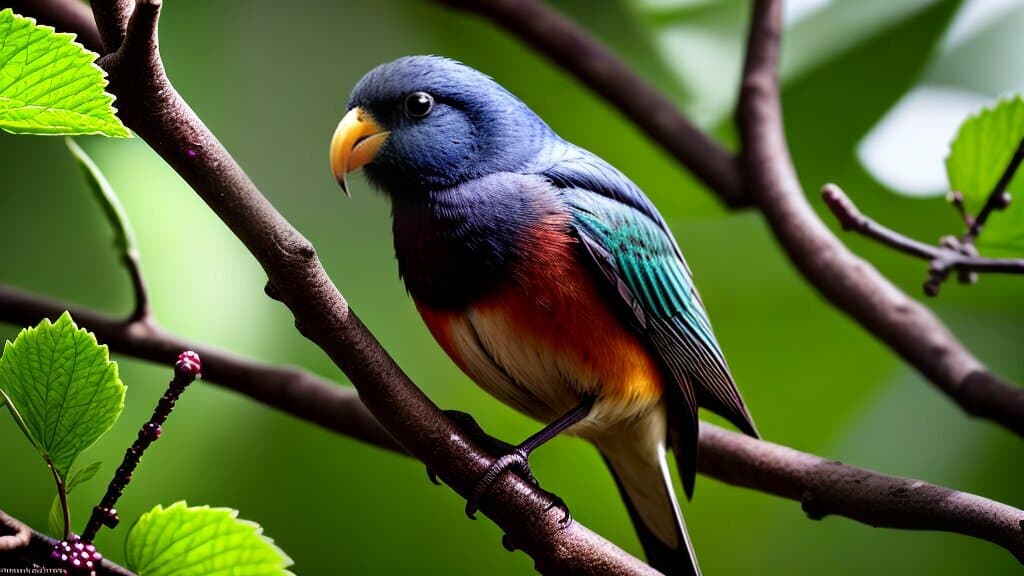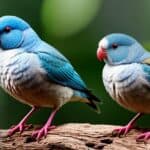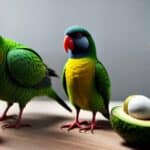Welcome to our article on whether kakarikis can safely consume blackberries. If you’re a bird owner, you may be wondering if it’s safe to feed these delicious fruits to your feathered friend. We’re here to give you the answers you need to keep your bird happy and healthy.
Can Kakarikis Eat Blackberries? blackberries, rich in antioxidants, vitamins, and minerals, are safe and beneficial for kakarikis. These fruits contribute to a balanced and nutritious diet, supporting their overall health and vibrant plumage. However, moderation is key as excessive consumption could lead to health complications due to their high sugar content. As with any new food, the introduction should be gradual to monitor any adverse reactions.
Key Takeaways:
- Kakarikis are omnivorous and enjoy a variety of foods such as fruits, vegetables, seeds, and insects.
- Blackberries contain important vitamins, minerals, and antioxidants that can benefit a bird’s health.
- Introducing blackberries in moderation and monitoring your kakariki’s response to the new food is important.
- A balanced diet is crucial for the overall well-being of your kakariki.
Understanding the Diet of Kakarikis
Kakarikis are native to New Zealand, and in the wild, their diet consists of a variety of foods. They are omnivorous, meaning their diet comprises plant-based foods and insects. The following are the nutrients and food groups present in their natural diet:
| Nutrition | Food group |
|---|---|
| Vitamins | Fruits and vegetables |
| Protein | Insects and seeds |
| Fat | Seeds and nuts |
| Carbohydrates | Fruits and vegetables |
As a result, it is essential to replicate their natural diet in captivity to ensure their overall well-being. A balanced diet should include fruits, vegetables, seeds, and some insects to provide the necessary nutrients. Kakarikis tend to prefer fruits over vegetables, so it is necessary to offer a variety of both to ensure their nutritional needs are met.
What Do Kakarikis Eat?
Kakarikis have a broad range of food choices, and their diet may include:
It is crucial to ensure that the kakariki’s diet is balanced in all aspects, including the quantity of food offered, to maintain their health and well-being.
Are Blackberries Safe for Kakarikis?
Feeding your kakariki a balanced and healthy diet is crucial for their well-being. When it comes to adding new foods to their diet, it’s important to consider their safety and nutritional benefits. Blackberries are a delicious and nutritious fruit that you may be wondering if your kakariki can safely consume.
Blackberries are safe for kakarikis to eat as long as they are given in moderation and properly prepared. These berries are low in fat and high in fiber, making them a healthy treat for your bird. However, it’s important to note that some birds may have allergies or sensitivities to certain foods, so monitoring their reaction to blackberries is essential.
While blackberries are safe for kakarikis, there are some risks to consider. Like most fruits, blackberries are high in natural sugars, which can cause health problems if given in excess. Additionally, non-organic blackberries may contain harmful pesticides that can harm your bird. Therefore, it’s important to choose organic berries whenever possible and wash them thoroughly before serving.
Overall, blackberries can be a great addition to your kakariki’s diet. They provide important vitamins and minerals while offering a sweet and delicious treat. As with any new food, it’s important to introduce blackberries gradually and monitor your bird’s reaction carefully. Always remember to provide a balanced diet for your kakariki and consult your vet if you have any concerns about their nutritional needs.
Nutritional Benefits of Blackberries for Kakarikis
Blackberries are a delicious and nutritious fruit that can offer several benefits to your kakariki’s health. These small berries are packed with vitamins, minerals, and antioxidants that can help to keep your bird healthy and happy.
One of the key nutritional benefits of blackberries is their high vitamin C content. This vitamin is essential for the health of your kakariki’s immune system, helping to protect against illness and disease. Blackberries also contain vitamin K, which plays a role in blood clotting and bone health.
In addition to vitamins, blackberries are a good source of potassium, calcium, and magnesium minerals. Potassium helps to regulate blood pressure, while calcium and magnesium are important for strong bones and muscle function.
Perhaps most importantly, blackberries are packed with antioxidants. These compounds help to fight off harmful free radicals in the body and protect against oxidative stress, which can contribute to the development of various diseases.
So, if you’re looking to give your kakariki a tasty and nutritious treat, blackberries are an excellent choice. Just be sure to introduce them in moderation and with a balanced diet to ensure your bird gets all the nutrients they need.
Introducing Blackberries into Your Kakarikis’ Diet
If you’ve decided to introduce blackberries into your kakariki’s diet, it’s important to do so gradually and in moderation. This will allow your bird’s digestive system to adjust to the new food.
Start by offering a small piece of blackberry and observe your bird’s reaction. If they seem to enjoy it and show no signs of discomfort or digestive issues, you can gradually increase the amount over time.
It’s best to wash blackberries thoroughly before serving them to your bird. If possible, choose organic berries to avoid any potential harmful pesticides.
As with any new food, it’s important to monitor your bird’s health and wellbeing after introducing blackberries into their diet. If you notice any adverse reactions or changes in behaviour, consult your avian veterinarian immediately.
Preparation Methods for Blackberries
There are a few preparation methods that can make blackberries easier for your kakariki to eat and digest.
| Method | Description |
|---|---|
| Cutting into small pieces | Blackberries can be cut into small pieces to make them easier for birds to eat. |
| Mashing or pureeing | Mashing or pureeing blackberries can make them easier to digest, especially for young or sick birds. |
| Freezing | Freezing blackberries can be a fun way to offer a cool treat to your bird on a hot day. Just make sure to thaw the berries before serving. |
Remember, while blackberries can be a healthy addition to your kakariki’s diet, they should be offered in moderation and as part of a balanced diet that includes a variety of fruits, vegetables, seeds, and pellets.
Potential Risks and Precautions
While blackberries are generally safe for kakarikis to consume, some potential risks are associated with feeding them this fruit. As with any new food, it is important to slowly introduce blackberries and monitor the bird’s response slowly and in small quantities.
One of the main concerns with feeding blackberries to birds is the potential exposure to pesticides. To minimize this risk, it is best to choose organic berries when possible. If organic berries are unavailable, thoroughly wash the fruit before offering it to your kakariki.
It is also important to note that some birds may be allergic to certain fruits, including blackberries. Signs of an allergic reaction can include vomiting, diarrhea, or difficulty breathing. If you notice any of these symptoms after introducing blackberries to your bird’s diet, seek veterinary attention immediately.
Feeding blackberries to your kakariki can be a healthy and enjoyable addition to their diet. However, as with any new food or treat, it is important to do so in moderation and with caution.
Alternate Fruits for Kakarikis
While blackberries can be a nutritious addition to a kakariki’s diet, it’s important to offer a variety of fruits to ensure a balanced intake of nutrients. Here are some other fruits that can safely be fed to kakarikis:
| Fruit | Nutritional Benefits |
|---|---|
| Apples | High in fibre and vitamin C |
| Pears | Rich in copper and vitamin C |
| Blueberries | Packed with antioxidants and vitamin K |
| Strawberries | Good source of vitamin C and manganese |
Remember to introduce new fruits gradually and in small amounts to prevent digestive upset in your kakariki.
Monitoring Your Kakariki’s Health and Well-being
Introducing new foods into your kakariki’s diet, such as blackberries, can be exciting but also requires careful monitoring of their health and well-being.
It is essential to note any changes in their behaviour, such as lack of appetite, lethargy or unusual faecal formation as these may indicate that blackberries do not agree with your bird.
If your kakariki shows any of these symptoms, it is best to discontinue feeding them blackberries and seek veterinary advice.
Remember that moderation is key, and blackberries should not be the only food in your bird’s diet. Always ensure a balanced diet, incorporating a variety of fruits, vegetables, pellets, and seeds, to meet your kakariki’s nutritional needs.
Providing a Balanced Diet for Kakarikis
While blackberries can be a nutritious addition to a kakariki’s diet, it is essential to ensure that they receive a balanced diet overall. A varied diet can prevent nutritional deficiencies and support their overall health and well-being.
Along with fruits, kakarikis should also have access to vegetables and protein sources. Non-toxic leafy greens, such as kale and spinach, can provide essential vitamins and minerals. Cooked beans, boiled eggs, and bits of chicken can offer much-needed protein to these birds.
It is also recommended to supplement their diet with high-quality pellets. These pellets contain a balanced mix of nutrients and can ensure that a bird’s daily nutritional needs are met.
Remember to introduce new foods slowly and monitor your bird’s response. While many foods are safe for kakarikis, some can cause an allergic reaction or digestive problems. Consult with a veterinarian if your bird shows signs of illness or discomfort.
Conclusion
In conclusion, kakarikis can safely consume blackberries in moderation as part of a balanced diet. While some bird owners may have concerns about the safety of feeding blackberries to their pets, it is important to note that these fruits contain essential nutrients that contribute to their overall health and well-being.
When introducing blackberries into a kakariki’s diet, it is important to choose organic berries, avoid pesticides, and monitor the bird’s response to the new food. It is also crucial to ensure that the bird’s diet includes a variety of foods, including fruits, vegetables, seeds, and pellets to meet their nutritional requirements.
Providing a Balanced Diet for Kakarikis
A balanced diet is essential for the health and longevity of kakarikis. These birds thrive on a variety of foods, including fruits, vegetables, seeds, and pellets. Care should be taken to incorporate a range of different foods to ensure that they receive all the nutrients they need.
Other safe fruits for kakarikis consumption include apples, pears, bananas, and strawberries. By incorporating these fruits alongside blackberries, owners can provide their pet with a diverse and nutritious diet.
Finally, it is important to monitor a kakariki’s health and well-being after introducing new foods to their diet. Owners should look out for any signs of illness or discomfort and consult a vet if necessary.
FAQ
Q: Can kakarikis eat blackberries?
A: Yes, kakarikis can safely consume blackberries as part of their diet.
Q: What do kakarikis eat?
A: Kakarikis have an omnivorous diet and enjoy fruits, vegetables, seeds, and insects.
Q: Are blackberries safe for kakarikis?
A: Blackberries are generally safe for kakarikis to eat.
Q: What are the nutritional benefits of blackberries for kakarikis?
A: Blackberries contain vitamins, minerals, and antioxidants that can contribute to the well-being of kakarikis.
Q: How can blackberries be introduced into a kakariki’s diet?
A: Blackberries should be introduced gradually and in moderation. They can be served fresh or mashed for easier consumption.
Q: What are the potential risks and precautions of feeding blackberries to kakarikis?
A: Choosing organic berries, avoiding pesticides, and monitoring the bird’s response to blackberries is important.
Q: What are some alternate fruits for kakarikis?
A: Other fruits that kakarikis can safely consume include apples, pears, and blueberries.
Q: How should I monitor my kakariki’s health after introducing blackberries into their diet?
A: Look out for any unusual changes in behavior or digestion and consult a vet if necessary.
Q: How can I provide a balanced diet for my kakarikis?
A: It is important to incorporate fruits, vegetables, seeds, and pellets into their diet to ensure their nutritional needs are met.



Have comments or questions about this article? Then get involved!
Spotted an error or something we have missed? Let us know